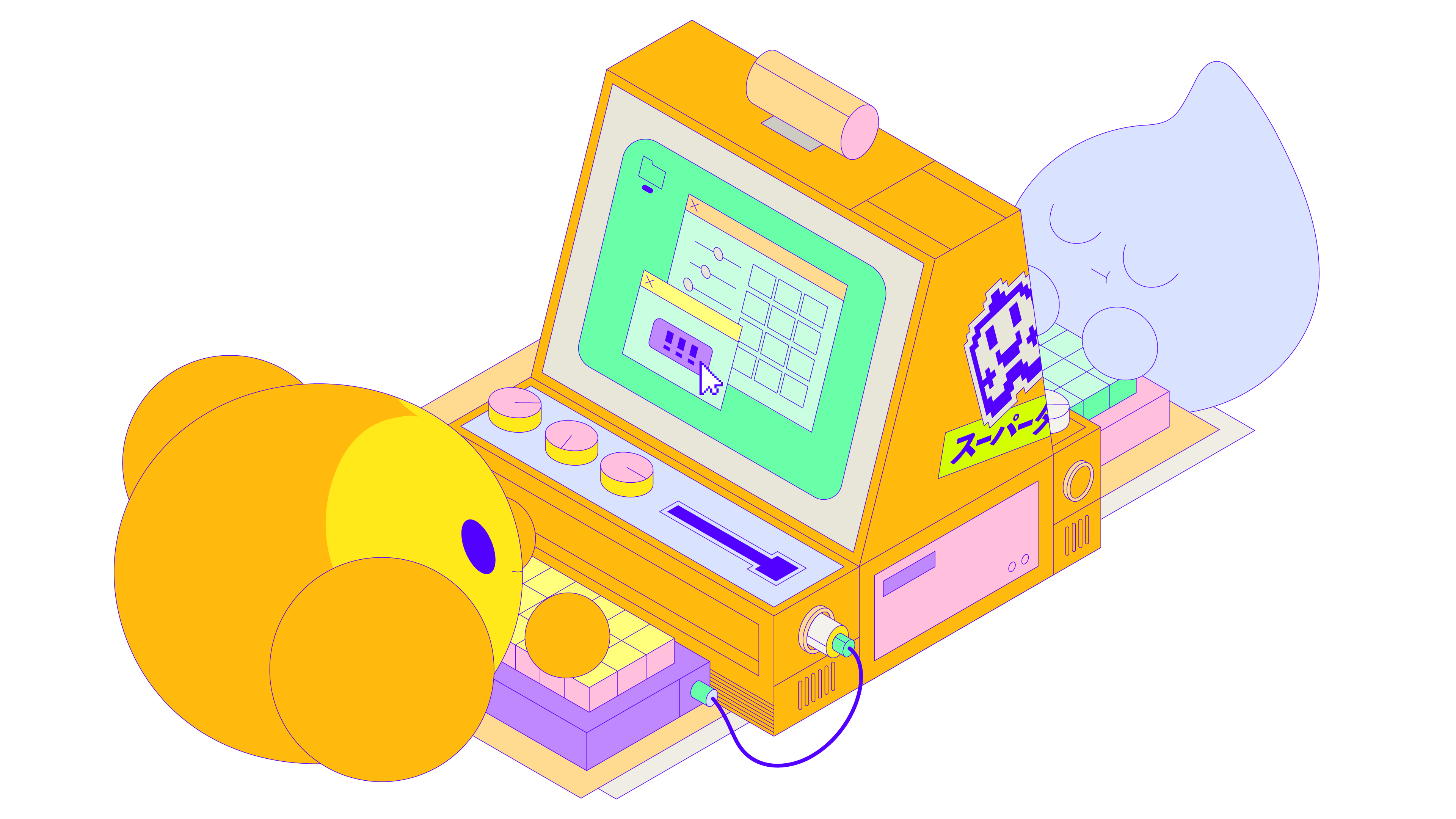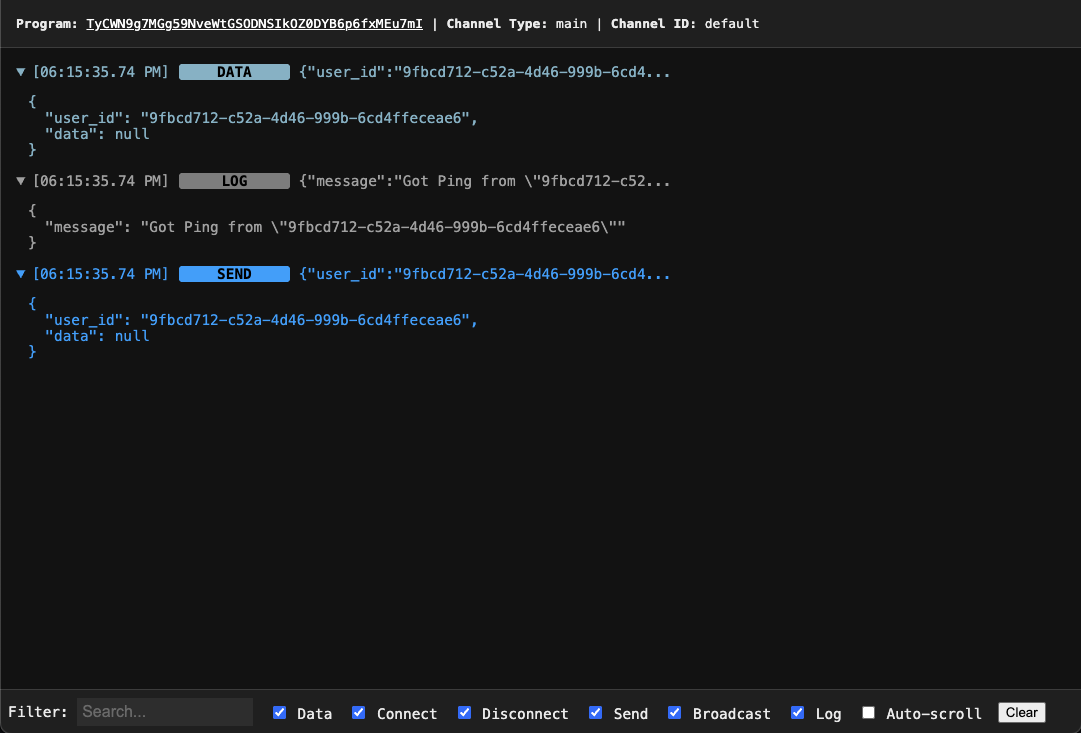Channels

Overview
The channel API lets your game subscribe to a Turbo OS channel to send and receive incoming messages asynchronously. Channels are good for fast-paced multiplayer gameplay and other features that require low latency + group broadcasts such as chat.
Creating a Channel (Server)
To demonstrate, let's make a "ping pong" channel that accepts "ping" messages and sends back "pong" messages in response:
Create Send and Recv types for the channel
Let's define our Ping and Pong structs:
use turbo::*;
#[turbo::serialize]
pub struct Ping;
#[turbo::serialize]
pub struct Pong;We will send Ping to the channel and receive Pong from the channel.
Use the Channel macro
Here, we use the turbo::os::channel macro to tag our ChannelHandler with program and channel names.
use turbo::*;
#[turbo::serialize]
pub struct Ping;
#[turbo::serialize]
pub struct Pong;
#[turbo::os::channel(program = "pingpong", name = "main")]
pub struct PingPongChannel; Implement ChannelHandler
Next, we have to implement the ChannelHandler trait:
use turbo::*;
#[turbo::serialize]
pub struct Ping;
#[turbo::serialize]
pub struct Pong;
#[turbo::os::channel(program = "pingpong", name = "main")]
pub struct PingPongChannel;
impl ChannelHandler for PingPongChannel {
type Recv = Ping; // incoming from client
type Send = Pong; // outgoing to client
fn new() -> Self {
Self
}
fn on_data(&mut self, user_id: &str, data: Self::Recv) -> Result<(), std::io::Error> {
log!("Got {:?} from {:?}", data, user_id);
Self::send(user_id, Pong)
}
} The new method is called when our channel first opens, and the on_data method is called whenever we receive a message from a player.
::::
Connecting to a Channel (Client)
Last, we can hook up the client
Subscribe to the channel
Subscribe to the "ping pong" channel to get a ChannelConnection which we will call conn:
use turbo::*;
#[turbo::game]
struct GameState {}
impl GameState {
fn new() -> Self {
Self {}
}
fn update(&mut self) {
if let Some(conn) = PingPongChannel::subscribe("default") {
// If we're in here, that means we connected the channel!
}
}
}Receive messages from the channel
Pull Pong messages using the ChannelConnection::recv method:
use turbo::*;
#[turbo::game]
struct GameState {}
impl GameState {
fn new() -> Self {
Self {}
}
fn update(&mut self) {
if let Some(conn) = PingPongChannel::subscribe("default") {
while let Ok(msg) = conn.recv() {
log!("Received pong from server!");
}
}
}
}Send messages to the channel
Send a Ping message to the channel whenever the start button is pressed using the ChannelConnection::send method:
use turbo::*;
#[turbo::game]
struct GameState {}
impl GameState {
fn new() -> Self {
Self {}
}
fn update(&mut self) {
if let Some(conn) = PingPongChannel::subscribe("default") {
while let Ok(msg) = conn.recv() {
log!("Received pong from server!");
}
if gamepad::get(0).start.just_pressed() {
let _ = conn.send(&Ping);
log!("Sent ping to the server!");
}
}
}
}Running your game
Review Your Code
Ensure that your src/lib.rs file is correct:
See full src/lib.rs source code
use turbo::*;
#[turbo::serialize]
pub struct Ping;
#[turbo::serialize]
pub struct Pong;
#[turbo::os::channel(program = "pingpong", name = "main")]
pub struct PingPongChannel;
impl ChannelHandler for PingPongChannel {
type Recv = Ping; // incoming from client
type Send = Pong; // outgoing to client
fn new() -> Self {
Self
}
fn on_data(&mut self, user_id: &str, data: Self::Recv) -> Result<(), std::io::Error> {
log!("Got {:?} from {:?}", data, user_id);
Self::send(user_id, Pong)
}
}
#[turbo::game]
struct GameState;
impl GameState {
fn update(&mut self) {
// Subscribe to the "ping pong" channel to get a `ChannelConnection`
if let Some(conn) = PingPongChannel::subscribe("default") {
// Pull Pong messages using the `ChannelConnection::recv` method
while let Ok(msg) = conn.recv() {
log!("Received pong from server!");
}
if gamepad::get(0).start.just_pressed() {
// Send a Ping message using the `ChannelConnection::send` method
let _ = conn.send(&Ping);
log!("Sent ping to the server!");
}
}
}
}Update your config
Update your turbo.toml file to include the following section:
[turbo-os]
api-url = "https://os.turbo.computer"Next, create a free dev account at https://os.turbo.computer. The dashboard will have your user ID.
turbo run -w --user <YOUR_USER_ID>It will prompt for a one-time password you can also find on your Turbo OS dashboard.
Once your game window opens, it will upload your program:
[turbo] Uploading "pingpong" (YOUR_PROGRAM_ID)...
[turbo] Uploaded "pingpong" (YOUR_PROGRAM_ID) ✨When connects to the channel, you will see some output like the following:
[turbo] Channel connection open:
- program : YOUR_PROGRAM_ID
- channel name : main
- channel id : default
- inspector url: https://os.turbo.computer/channels/YOUR_PROGRAM_ID/main/default/inspectorIf you press the start button on a gamepad or space on a keyboard, you will see the following output on the command line:
[turbo] Sent ping to the server!
[turbo] Received pong from server!Check the Channel Inspector
You can visit that "inspector url" to view the channel inspector page. There, you can observe messages sent to/from the server, user connection/disconnection events, and logs:
